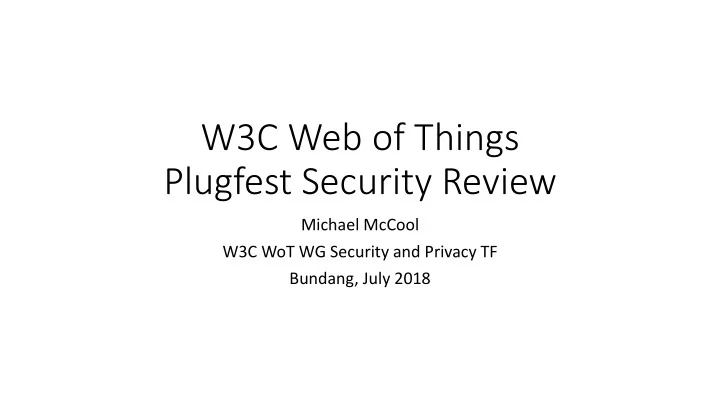

W3C Web of Things Plugfest Security Review Michael McCool W3C WoT WG Security and Privacy TF Bundang, July 2018
Outline • Who tried what • Intel, Panasonic, Smart Things, Siemens, EURECOM, others? • HTTPS (direct and via proxy), Auth (basic, digest, bearer tokens, psk) • Issues Arising • Security Metadata Structure • Definitions, multiple levels (2? 3?) • Security Metadata Content • Schemes, scheme parameters, vocabulary • Interactions with Architecture • Proxies • TO DO • Online and plugfest • Security testing and validation
• Secured services Intel • Thing Directories (cloud and gateway) • Auth • Thing Playground (cloud) • OCF-WoT metadata bridge (gateway) • HTTP Basic • CoAP/HTTP bridge (gateway) • HTTP Digest • OCF devices (via CoAP/HTTP bridge) • Encryption • Simple-webcam (native web service) • HTTPS Proxy endpoint, Let's Encrypt certs • Other notes • Running in cloud service • Two cloud servers • Transparent proxy (endpoint wrapper) • Two separate local networks behind NATs • Both cloud and reverse tunneled HTTP services • Direct HTTPS with Let's Encrypt certs • TDs with multiple forms (different endpoints) with different security for the • Running on local device; reverse tunneled out same physical device and exposed on cloud endpoint • Challenges with port 22 being blocked… • Certificate valid for cloud endpoint; but TLS managed by device (end-to-end security) • Direct HTTPS with self-signed certs • For local devices • Client must accept self-signed cert
Siemens • Auth • HTTP basic • JWT bearer tokens • Encryption • HTTPS • Other • HTTP proxy support: • Both forward proxies and reverse proxies (things only reachable through proxies) • Used with Oracle instance • Bearer tokens with Fujitsu beacon light
Panasonic: Implementation 1 • Bearer authentication using "bearer" security In forms for interactions that did not use security, used this: scheme "forms": [ • Indicated authorization Url … {"href": "operationStatus", • But actually formed a bearer token manually "mediaType": "application/json"}, • Specified security in TD by default {"href ": "https://…/operationStatus", • Indicated no authentication is required using "security": [] override. "mediaType": "application/json", At top level, used this: "subProtocol": "LongPoll", "security": [{ "rel": "observeProperty", "scheme": "bearer", "security": [] "format": "jwt", }, "alg": "ES256", {"href": "wss ://…./ operationStatus", "authorizationUrl": "…" "mediaType": "application/json", }], "rel": "observeProperty", "security": [] } ]
Panasonic: Implementation 2 • Online WoT Server Simulator requires the following HTTP header upon request X-PWOT-TOKEN: <access token> However, the TD is not correct at this moment. Currently we have: "security": [{ "cat": "token:jwt", "alg": "ES256", "as": "https://plugfest.thingweb.io:8443" }], • It should updated to the new TD specs. • It should use "scheme": "apikey". ==> plan to update the TD of Online WoT Server Simulator by the next PlugFest.
Smart Things • Example TDs for CoAP devices using PSK • Raising need for CoAP-specific security metadata • MQTT metadata can probably reuse existing vocabulary, eg "basic" • An assumption that needs to be tested
Eurecom • Auth: • Bearer tokens • Encryption • HTTPS for both Things and TD service • TDs encrypted and decrypted after download using pre-shared key
Issues Arising • NAT Traversal • Can't depend on port 22 being open… • Pre-shared keys • Is "scheme": "psk" needed? • Self-signed certificates • Need to validate certificate: Onboarding service? Validation service? • Is "scheme": "cert" needed? • Security definitions vs activated security configurations • Multilevel security configurations • Right now can be given at three levels; top, interaction, form • Configurations at lower overrides higher • All three needed? • "Add-on" security configurations • Would be nice to have way to add configs, not just overrides
Next • Implementations/use cases for all existing schemes • New schemes • Local TLS/DTLS • MQTT, CoAP, OCF • Basic auth over HTTPS, Digest over (local) HTTP • Demonstration of at least one scheme using external vocabulary • And maybe move some existing schemes out to external vocabulary…
Recommend
More recommend